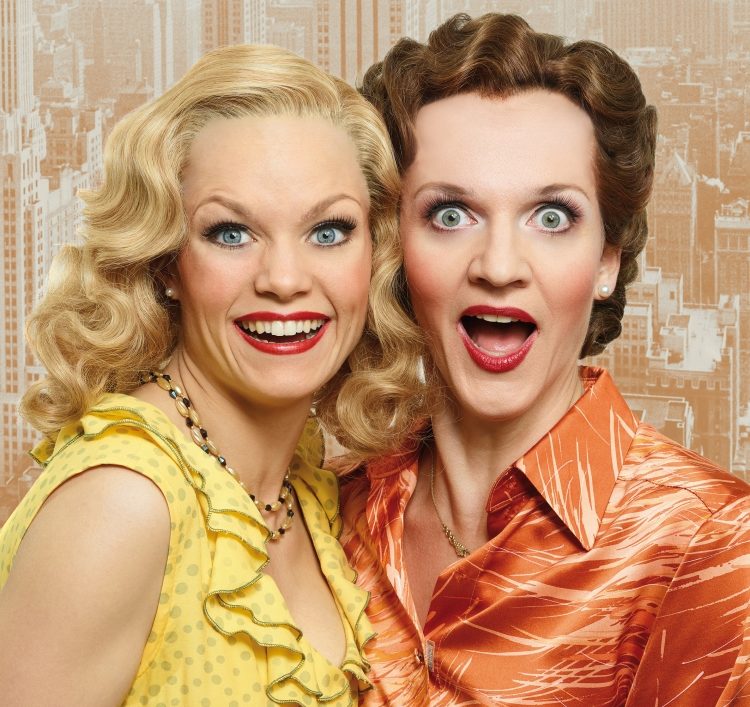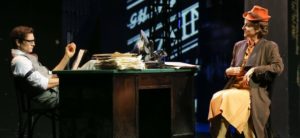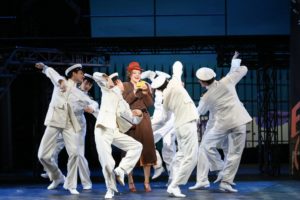 Vienna Volksoper can boast the European premier of Wonderful Town: in November 1956 Leonard Bernstein’s second musical staged here only three years after its world premier. Yet, until 1955, Vienna was occupied by the Allies and Soviet Russia: Austria newly independent, neutral between the West and the Soviet block (its neighbours Hungary and Czechoslovakia only liberated in 1989/90.) Post-war Vienna was grim and austere, the world of Harry Lime and The Third Man. So imagine the shock: Bernstein’s jazz-influenced score, the views of New York, and of its beat generation – transported to this dystopa, by the super-cool, hipster, Bernstein, in white polo necks, notorious for disdaining collar and tie. Bernstein took to-and was adopted by – Vienna. (In the 1970s he regularly conducted the Vienna Philharmonic, famously persuading them to play Mahler.) So, to commemorate his 100th, it’s fitting that Volksoper should revive Wonderful Town – celebrating not Vienna, but his own New York.
Vienna Volksoper can boast the European premier of Wonderful Town: in November 1956 Leonard Bernstein’s second musical staged here only three years after its world premier. Yet, until 1955, Vienna was occupied by the Allies and Soviet Russia: Austria newly independent, neutral between the West and the Soviet block (its neighbours Hungary and Czechoslovakia only liberated in 1989/90.) Post-war Vienna was grim and austere, the world of Harry Lime and The Third Man. So imagine the shock: Bernstein’s jazz-influenced score, the views of New York, and of its beat generation – transported to this dystopa, by the super-cool, hipster, Bernstein, in white polo necks, notorious for disdaining collar and tie. Bernstein took to-and was adopted by – Vienna. (In the 1970s he regularly conducted the Vienna Philharmonic, famously persuading them to play Mahler.) So, to commemorate his 100th, it’s fitting that Volksoper should revive Wonderful Town – celebrating not Vienna, but his own New York.
Against a New York skyline, Volksoper orchestra (under James Holmes) conducted the overture sounding like a jazz big band with pizzazz: oh, those silky saxophones,and muted trumpets, Woody Allen (Manhattan) would have loved it. A group of tourists file through the stalls led by their guide (Oliver Liebl)- cleverly, they’re German-speaking. The place is Greenwich Village, the beat quarter, from the 1940s, home to poets, painters and jazz clubs. And Christopher Street- if Bernstein had known (in 1953)- a gay quarter, fifteen years later, the centre of Gay Liberation.
The choreography (Melissa King’s) for the opening number is stunning. They’re all in brilliantly coloured 1950’s gear. Come along, follow me… There’s a REAL jazz musician, a black guy in a pink candy-striped suit, Speedy Valenti (Cedric Lee Bradley), who runs the Village Vortex.
Ruth Sherwood (Sarah Shütz), red-haired, in a tailored suit, the serious one of the sisters, is carrying a heavy typewriter. As Eileen, the would-be actress, Olivia Delauré’s vivacious platinum, blonde, in a frilly, patterned frock, is like a starlet popped off a Hollywood film set.
The multiple screens of New York views (Mathias Fischer-Dieskau) open onto a grotty basement flat- below the sidewalk- with pink brick walls, faded settee, peoples’ legs seen walking through the skylight overhead. The room costs 100 dollars upfront; the long-haired Greek painter and landlord (Christian Dolezal) disappears as the room shudders like an earthquake: the overhead subway. With no curtains, the streetlight keeps them awake, the sisters sharing the bed, ogled by men above, (the apartment’s last occupant a sex-worker.)
They sing of their home in Ohio- one of Bernstein’s stand-out numbers- ‘Much too far away from you, Ohio’, home sick already. But, ever-hopeful, up early, they’re out job hunting.
To funky jazz piano, and percussion, we see commuters crushed together on the subway, a human phalanx. One of Bernstein’s sensational up-beat, jazz syncopated numbers, the crowd scene prefiguring the street-life of West Side Story. It bursts into a dance sequence, jaw-dropping, with Vienna State Ballet dancers joining the Volksoper Chorus. Fabulous jazz trumpet! What a beat! … “The excitement! Political awareness . Wonderful fashions. And the songs! What a beat”, they wrote. This is what hit Broadway in 1953.
 In Matthias Davids’ direction, a fast-moving montage with the sisters each trying for job interviews, Eileen fights off the (Me-Too) director on the casting couch, while Ruth, the aspiring writer, is forever fobbed-off with her script. Finally, she sees Editor Robert Baker (Drew Sarich, a star in his own right.) He quickly dismisses her text- Go back home! Ruth’s cue for ‘A hundred ways to love a man.’ It’s wry and witty (even in German), and Sarah Schütz, a gutsy mezzo -soprano, has loads of charisma , an actress and chanteuse: musical performer, cabaret artiste, dancer. The story she’s written is a lead-in for a safari dance sketch, with lions roaring around the theatre through the theatre’s sound system.
In Matthias Davids’ direction, a fast-moving montage with the sisters each trying for job interviews, Eileen fights off the (Me-Too) director on the casting couch, while Ruth, the aspiring writer, is forever fobbed-off with her script. Finally, she sees Editor Robert Baker (Drew Sarich, a star in his own right.) He quickly dismisses her text- Go back home! Ruth’s cue for ‘A hundred ways to love a man.’ It’s wry and witty (even in German), and Sarah Schütz, a gutsy mezzo -soprano, has loads of charisma , an actress and chanteuse: musical performer, cabaret artiste, dancer. The story she’s written is a lead-in for a safari dance sketch, with lions roaring around the theatre through the theatre’s sound system.
Of a motley crew of Greenwich village eccentrics, ‘the wreck’, Loomis, is a would-be football player: Marcus Günzel, lanky, forever in shorts, and tailed by his fiancee, the diminutive, exquisitely sung Juliette Khalil. Günzel’s Loomis sings the show-stopping refrain, ‘I was good at football, (not a schoolwork.)’ Eileen invites her male suitors, including Chick Clark (Christian Graff) for supper, and phones Bob for Ruth. They’re all cramped together awkwardly on that couch.
‘You have talent, Miss Sherwood, but write about what you know’ (not safari parks.) He wants to help her, but she thinks she’s being brushed off. Why does he always go for that type, he sings, the quiet girl. Where is my quiet girl, the special girl. Drew Sarich holds the stage, exuding a masterful authority, the audience spellbound.
Then, by contrast, a sensational conga number. Ruth is commissioned to report on Brazilian sea cadets! Any excuse for young sailors in tight white uniforms and the show’s wildest dance routine. They follow Ruth out on the streets, she, eventually leading them to the apartment.  Schütz- teasing, vibrant, a match for these professional Latin dancers, is finally tossed up and carried shoulder high.
Schütz- teasing, vibrant, a match for these professional Latin dancers, is finally tossed up and carried shoulder high.
Eileen, now hooked-up with Graff’s policeman, has an entire police station in love with her. Darling Eileen, they toast her in chorus. Meanwhile, Ruth, we see, street-selling for the Village Vortex (a play on the jazz club Village Vanguard.) Schütz excels in the star number SWING IT! Finger-clicking good, scat, jazz-inspired dancing, cool like in the 1940s and 50s when the word was coined. Great, up-tempo ensemble dancing, perhaps a forerunner for the Jets’ anthem in West Side Story. This is the musical soundtrack for the beat age.
Bob, it seems, has left ‘Manhattan Magazine.’ He sings a soliloquy In Love (Verliebt). He’s in love, can hardly think: he feels like another man. In love! This made my evening, the star number, the tune that stays in your head long after you leave: as in all the best musicals.
Then, the finale, VILLAGE VORTEX, a louche, erotic dance sequence. It begins with young men’s bodies laid out on stage. The opening, to a wailing clarinet, igniting into a ballet in a dance club, the Village Vortex come alive. The two sisters take the stage in a spectacular dance routine, while Lee Bradley, the black owner, reigns supreme, jiving on the roof of his Vortex. Finally, Bob cuddles up to Ruth, rather to her surprise. It’s a wonderful town, they sing.
This is a five star production of a relatively neglected Bernstein musical. But I can’t give it full marks. Not because it’s in German – that’s Volksoper’s policy – but because there were no English subtitles. (Frankly, there’s a lot of dialogue, and it would need more than voice coaches to translate New York humour.) This wonderful production is too good not to share with an international audience! © P.R. 7.1.2019
Photos: Olivia Delauré (Eileen) and Sarah Schütz (Ruth) © Stephan Floss
Drew Sarich (Robert Baker), Sarah Schütz (Eileen); Sarah Schütz (Eileen) with Vienna State Ballet dancers; Featured image Olivia Delauré, Sarah Schütz, Cedric Lee Bradley © Barbara Pállfy/ Volksoper Wien
viennaoperareview.com
Vienna's English opera blog
